Colonialism is the policy or practice of a country installing a settlement of its people on a foreign land. Usually, a colonizing country also quickly establishes political control over the other land. Colonialism is generally associated with the European overseas expansion that began about 1500. But it has occurred in most parts of the world and in most historical eras, even in ancient times.
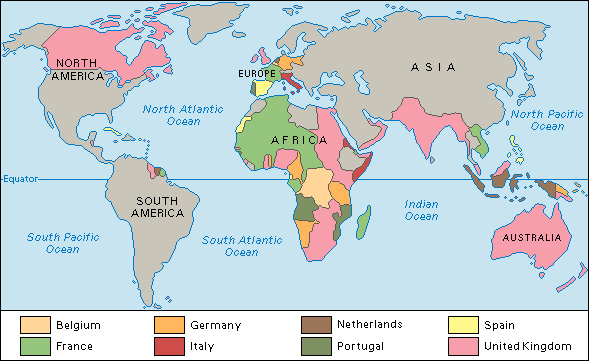
Through the centuries, nations have established colonies mostly for economic reasons. For example, nations have set up colonies to gain access to valuable manufactured items. Other reasons to establish a colony included securing access to raw materials or providing markets for goods. Nations have also sent out colonists to search for precious metals or to trade for scarce and valuable spices and specialized crops. In some cases, religious organizations strongly supported colonization efforts as a way of gaining converts among nonbelievers.
Colonizing powers often had better technologies or at least had advanced military weapons or tactics. For example, the Spanish expeditions against the Indigenous (native) peoples of Central and South America during the 1500’s succeeded in part because the Spaniards had better weapons. Their armor, metal swords, and muskets gave them a great advantage over Indigenous defenders, who had never developed such equipment.
Colonialism is similar to imperialism, which involves one country having political or economic control over another society. The two are often associated because imperial powers typically establish colonies in societies they control. See Imperialism.
History of colonialism
Ancient colonialism.
The Phoenicians were based in what are now roughly the coastal areas of Syria, Lebanon, and Israel. Starting about 1100 B.C., they established themselves as the dominant traders in the Mediterranean region. As they sailed along the Mediterranean shores, they founded numerous colonies, including Utica and Carthage in northern Africa.
The Roman Empire, which began about 264 B.C., was the greatest colonial empire of the ancient world. At its height in the A. D. 100’s, it ranged from northern Britain to the Persian Gulf and included much of northern Africa. In 395, following a period of disorder, the empire was permanently divided into two parts. The divisions had capitals in Rome in the west and Constantinople (now Istanbul, Turkey) in the east. A Germanic general serving in the Roman army overthrew Romulus Augustulus, the last official emperor of the West Roman Empire, in 476. The East Roman Empire survived as the Byzantine Empire until 1453, when the Ottomans captured Constantinople.
Early European colonialism.
In the 1400’s, Portugal and Spain sent ships into the eastern Atlantic Ocean in search of new sources of wealth and trade. In the late 1400’s, Portuguese colonists began to settle on the islands of São Tomé and Príncipe off the west coast of Africa. The Portuguese developed sugar plantations on these islands and on others they colonized along the coast. They then traded for African captives, whom they enslaved and used as the labor force on the plantations.
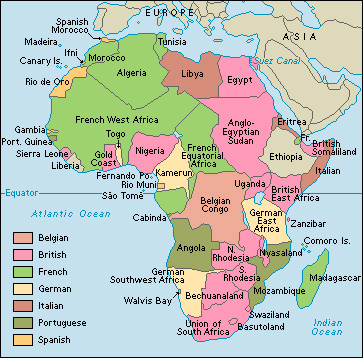
Also in the late 1400’s, Spain established a colony on the Canary Islands. The Spaniards conquered the people of the islands and forced them to work on Spanish sugar plantations there. Spain established a permanent colony on the island of Hispaniola in the Caribbean Sea in 1494. As the Spaniards spread across the Caribbean islands, they set up cities and sugar plantations. As they had on the Canaries, the Spaniards forced the islanders to work on their plantations.
From 1519 to 1521, an expedition led by the Spanish explorer Hernán Cortés conquered the Aztec Empire of Mexico. The Spaniards went on to take control of the greater part of Central and South America. Brazil came under the control of the Portuguese, who had established a colony there in 1532. Spain also established frontier missions in parts of what are now the southwestern and southeastern United States.
During the 1600’s, the Dutch, English, French, and Swedes founded colonies in eastern North America. There, they competed for land and riches. In 1763, the British gained control of nearly all of North America from the Atlantic Ocean to the Mississippi River.
The Dutch colonized the Spice Islands (now part of Indonesia) beginning in the 1600’s. Most early Dutch settlers were based in the colonial capital of Batavia (now Jakarta) on Java. The Dutch also established a settlement at Cape Town on the southern coast of Africa in 1652.
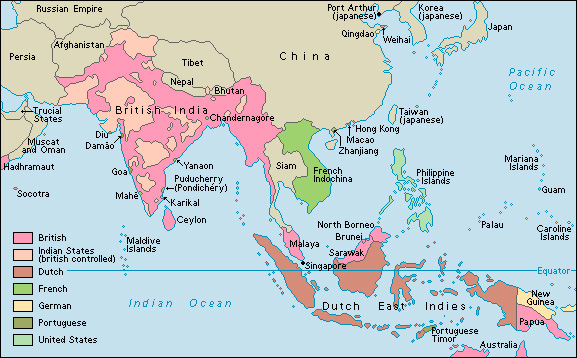
Later colonialism.
Eventually, the North and South American colonies came to feel culturally separate from their mother countries. The colonies increasingly resented being ruled from afar. Colonial economies had developed, and the colonies no longer relied on their founding nations for prosperity. The thirteen British North American colonies that became the United States declared their independence in 1776. Britain recognized them as independent in 1783. The rebellious enslaved people of French-controlled Haiti fought for over a decade before that country achieved independence in 1804. The mainland Latin American societies gained independence between 1818 and 1825. Cuba, however, remained a Spanish colony until 1898.
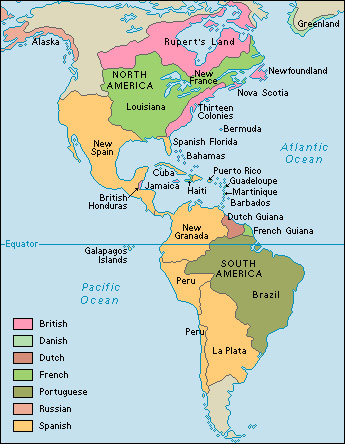
While colonialism declined in the Americas, it increased in Asia and Africa. In the 1780’s, the British began to colonize parts of lightly populated Australia with convicts. At that time, several nations sent criminals to distant prison colonies. France began its conquest and settlement of Algeria in the 1830’s.
In the 1870’s, several European nations began a furious race for colonies in Africa, Asia, and the Pacific Islands. This rush for colonies was brought about in part by an increasingly bitter rivalry among Europe’s most powerful countries. The United Kingdom, France, and Germany were the most active colonizers. Italy, Spain, Belgium, and Portugal, however, also took part. By the early 1900’s, these countries had divided up all of Africa—except for Ethiopia and Liberia—among themselves. In the 1800’s, the United Kingdom also expanded its control over India and what are now Malaysia and Myanmar. The French seized Indochina and some Pacific Islands.
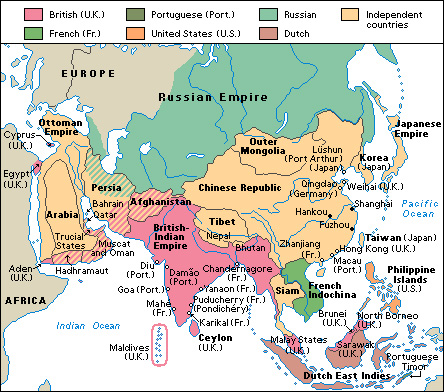
New colonizing nations appeared at the end of the 1800’s and the beginning of the 1900’s. The United States acquired Guam, Hawaii, the Philippines, and Puerto Rico. Japan took over Korea and Taiwan, took control of a large part of northern China, and occupied some Pacific Islands. After its defeat in World War II (1939-1945), Japan lost all of these possessions. It later regained some of the islands.
Decolonization.
Large-scale colonialism came to an end during the 30 years following World War II. Many colonies won their independence peacefully. Others, including Algeria, Kenya, and Vietnam, engaged in armed uprisings to achieve self-government.
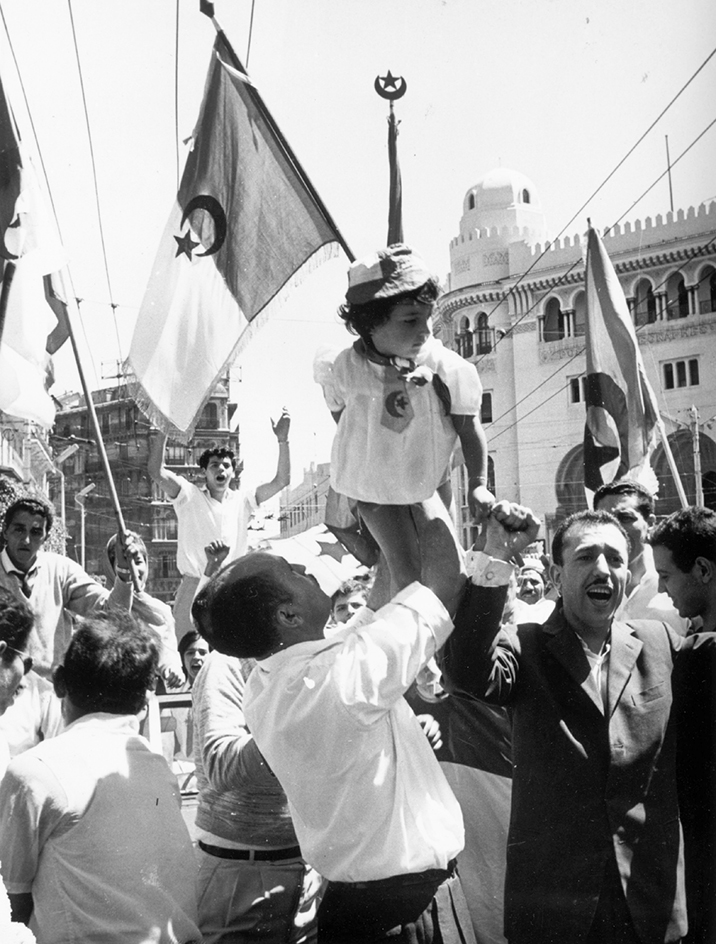
Various factors contributed to the rapid decolonization of the mid-1900’s. For example, most peoples of the world had come to believe in self-determination, democracy, and human rights. Most colonies had developed a sense of nationalism. Native-born people had been educated to serve as administrators and professionals. Colonies had also become economic burdens for the European powers. These nations wanted to concentrate on their own reconstruction after the vast destruction of the war. In addition, non-Communist colonial powers, such as the United Kingdom and France, feared that if they did not grant their colonies freedom, the colonies might side with the powerful Communist countries— the Soviet Union and China. Colonial powers feared extreme uprisings would result from colonies forming an alliance with Communist nations.
Today, several countries, including the United Kingdom, France, and the United States each control a few island dependencies in the Pacific Ocean or Caribbean Sea. In many of these small societies, the residents have voted to remain dependencies.
Colonialism has nearly disappeared. Some people, however, believe many of its features remain in the form of neocolonialism. Neocolonialism is the informal political and economic domination of less developed countries by wealthy nations.
Colonial rule
The policies of countries toward their colonies varied greatly over the centuries and in different parts of the world. The lasting impact of colonialism on modern nations that were once colonies also has varied.
Colonial economic policies.
Colonizing nations sought to prosper from their colonial possessions. They often taxed their colonies heavily. They also usually placed limits on colonial trade and production.
From the 1500’s to the 1700’s, a number of countries followed an economic policy called mercantilism. Under mercantilism, a nation’s wealth was measured by the precious metals it accumulated. A nation gained these metals through favorable balances of trade (the difference between the value of all the imports and that of all the exports) with its dependencies and with other countries. The mother country would ship finished manufactured items and agricultural products to the colonies. In exchange, colonies would ship back silver and gold, raw materials, or valued products that the mother country could sell for a profit. This approach depended heavily on government regulation of the economy. This heavy regulation greatly limited free trade. In many cases, colonizing nations also required ships sailing to and from the colonies to pass through the ports of the mother country, regardless of a ship’s final destination.
Colonial powers also sought to benefit from the resources and labor of the native peoples. A substantial source of state income in the Spanish American colonies was the obligation for each Indigenous adult male to give tribute (forced payment) to the colonial government. Government regulations also forced this same population to work for little or no pay for a certain number of days on farms or in mines run by the colonizers.
In some colonies of the New World, the European powers set up plantations on which they grew mainly sugar, tobacco, and indigo, a plant used to make blue dye. To provide cheap labor for the plantations, the European powers established the Atlantic slave trade.
Under some colonial systems, colonies were forbidden from competing with the mother country in certain industries. In addition, some countries taxed products that the colonized population consumed.
To make the economy more efficient, colonial powers typically constructed modern communication and transportation systems. In many cases, they also improved medical and public health facilities. Although these improvements helped the colonized peoples, their main purpose was to further the colonizers’ control over local resources and laborers. Colonists rarely hesitated to take land away from the native people to use for private commercial purposes. Colonial governments typically did not even try to prevent colonists from doing so.
Colonial government.
Ruling nations usually sent citizens from the mother country to the colonies to serve as administrators. They expected that such officials would be more loyal to the colonial nation’s interests than would local people. But through the years, the number of local people named as officials increased. Particularly before the late 1800’s, the long distance separating most colonies from their mother countries and the slowness of communication and transportation made most colonial administrations virtually independent. Local colonial administrators often chose which policies issued from the mother country would be enforced.
Effects of colonialism
The effects of colonialism are still felt today. For example, the official language of many former colonies is that of the mother country. In general, colonialism had long-term economic, political, and social effects.
Economic effects.
Colonial policies prevented or discouraged colonies from industrializing or expanding on the kinds of products they made. Instead, most colonies remained dependent on the production of a limited number of raw materials. Trade regulations and tariffs generally limited exports only to the home country, and then at unfavorable terms of trade. Few, if any, native people had opportunities to become business leaders. Consequently, with the end of colonialism, many former colonies remained economically dependent on their mother countries.
Many native people were stripped of their lands. These people were then forced into unfavorable wage-earning employment or unequal tenant farming contracts with estate owners. Numerous others migrated to the new cities that sprang up under colonialism to work for scant wages. Even improvements in public health hurt the colonized people economically, because the population grew at a rapid pace. As a result, an abundance of laborers competed for a small number of jobs and unemployment grew.
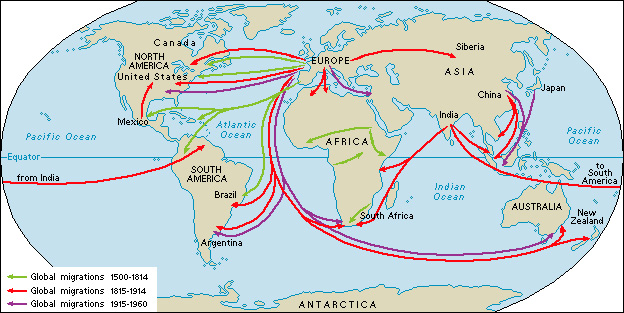
Political effects.
Colonialism often ended petty wars and local rivalries. But it could create largely artificial countries, binding together different peoples who might have little in common. In many cases, especially in the British colonies in Africa, the colonial government ruled the people through traditional chiefs and other local leaders. But few native people, even those educated at European universities, received administrative positions with any real authority at the colonial level. Therefore, the people often had little experience in governing when they gained independence.
Even colonizing countries of the 1800’s and 1900’s that claimed to support democracy, civil rights, and free elections often permitted only political movements that favored them in their dependencies. Because of colonial policies, many countries had little experience with democratic institutions when they became independent.
Social effects.
The public and church schools set up in colonies generally emphasized the culture of the colonial power. Missionaries tried to persuade the native peoples that the religion of the colonizers was better than their traditional religions. In addition, colonial authorities often sought to turn ethnic or religious groups against one another to consolidate their own power. In what is now Rwanda in Africa, German—and, later, Belgian—colonial policies deepened traditional divisions between the Tutsi and the Hutu ethnic groups. After Rwanda became independent in 1962, violent clashes between those two groups increased. In 1994, Hutu extremists slaughtered about 800,000 Tutsi and moderate Hutu.

